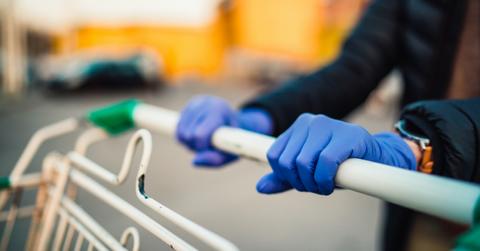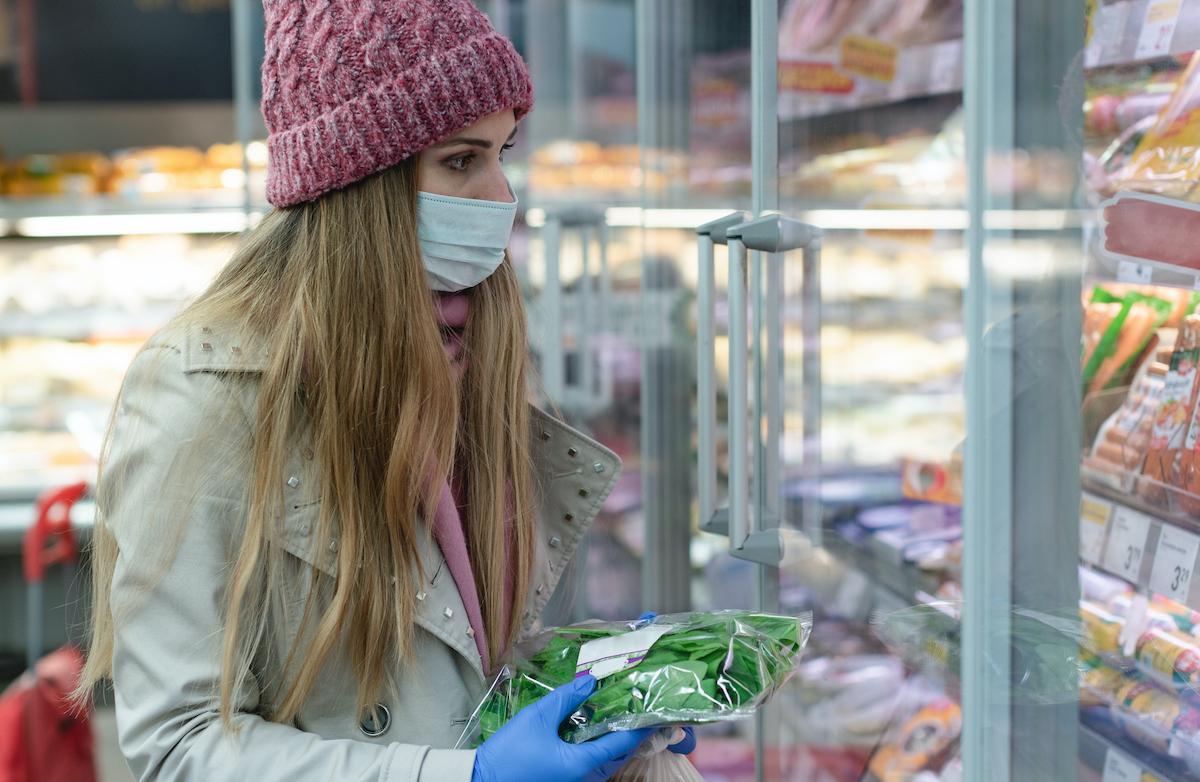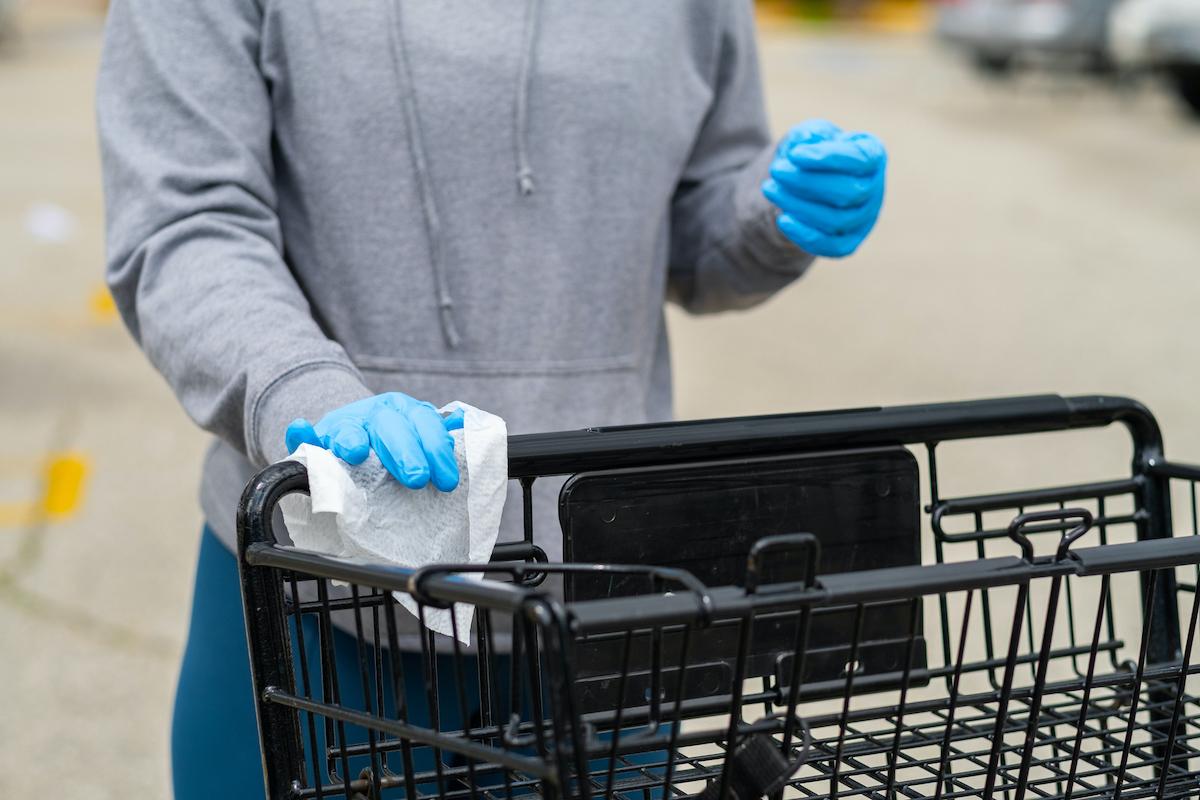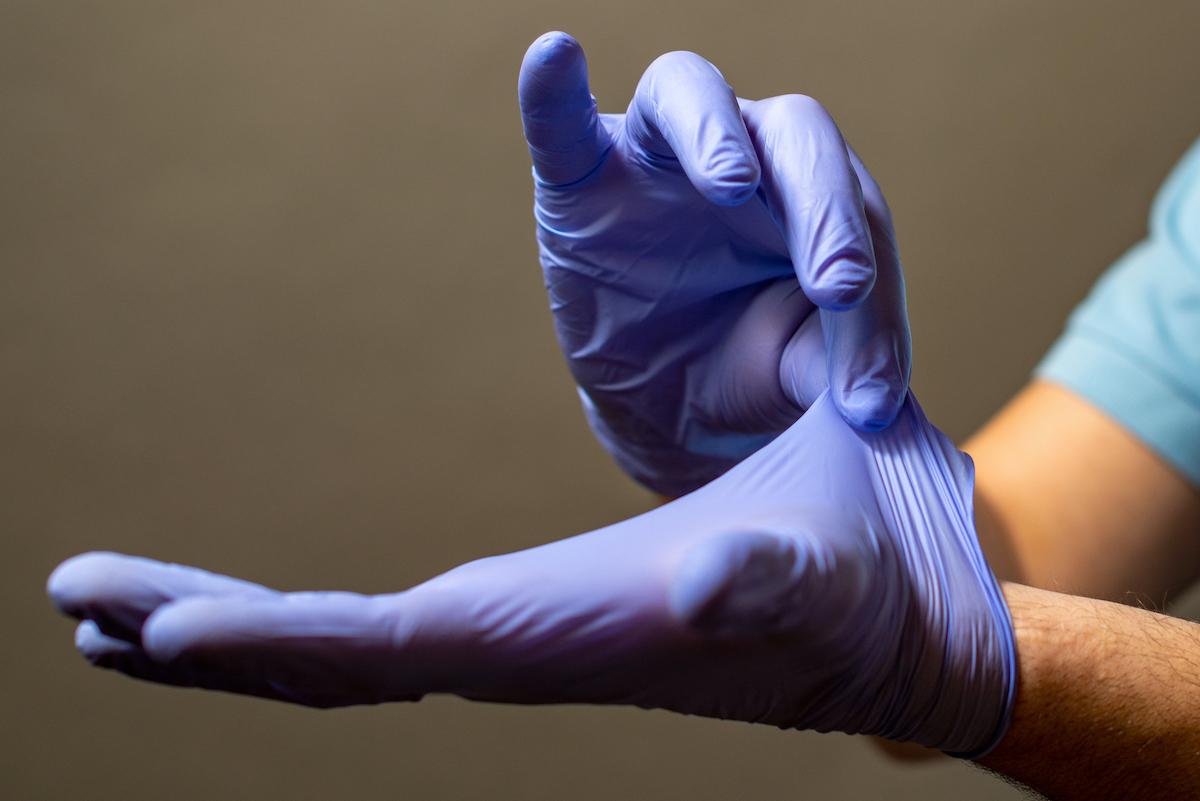Why You Don't Need to Wear Gloves to the Grocery Store
Single-use gloves are not only wasteful, but also unnecessary for grocery trips.
Updated May 6 2020, 5:40 p.m. ET

Now that wearing face masks in public has become the norm, you may be wondering if wearing disposable gloves provides any protection from COVID-19. To find out when — if at all — we should be wearing plastic gloves during the coronavirus pandemic, we checked in with two medical professionals.
Read on for answers to all your questions about wearing gloves, keeping yourself protected, and making sure you don’t spread the virus during the pandemic.
Should we wear gloves to protect ourselves from the coronavirus?

According to Dr. Shannon Sovndal, a Colorado-based board-certified doctor in emergency medicine and emergency medical services (EMS), wearing gloves generally does not protect humans from COVID-19.
“I don’t recommend gloves. Masks and hand cleaner are where it’s at,” Dr. Sovndal, author of Fragile: Beauty in Chaos, Grace in Tragedy, and the Hope that Lives In Between, tells Green Matters in an email. “Your hands are exposed to an unbelievable amount of nastiness every day. Your skin does an amazing job of protection. This virus is not transmitted through your skin. Limiting infection revolves around good hand hygiene.”
Texas-based general surgeon Dr. Charles W. Page shares the same belief — as he told Green Matters in a recent phone interview, regularly washing hands or applying hand sanitizer is more effective than wearing gloves, even if you regularly change them.
The World Health Organization (WHO) agrees as well. As the group posted on Facebook: “Regularly washing your bare hands offers more protection against catching COVID-19 than wearing rubber gloves.”
Should we wear gloves to the grocery store?
The WHO, the Centers for Disease Control and Prevention (CDC), and both Dr. Sovndal and Dr. Page agree that gloves are not necessary for a trip to the grocery store.
“Wearing gloves gives you little benefit,” says Dr. Sovndal. “When I go out to the store, I wear a mask and no gloves. I just follow the rule of cleaning my hands frequently and I always clean [my hands] before touching my face.”
How do gloves transmit the coronavirus?

Many people see gloves as a sort of security blanket, protecting their hands from touching the virus — but while you can sanitize your hands during an outing, you can’t sanitize gloves as easily.
“All gloves can transmit the virus — sterile gloves, surgical gloves, gardening gloves and winter gloves,” Dr. Sovndal continues. “If a glove comes in contact with the virus, it can then transmit it to you through your eyes, nose or mouth.”
“If you’re going out with gloves, think about it — you’re touching something, and it’s staying on [the gloves],” Dr. Page, author of A Spoonful of Courage for the Sick and Suffering, adds. “So every time you touch something, you’re contaminating something. You’d have to change gloves over and over and over again.” And if you do choose or need to wear gloves in public, you’d still need to apply hand sanitizer before you put them on, and after you take them off, every time — so you may as well cut gloves out of the process.
How is the coronavirus transmitted?
Overall, Dr. Sovndal thinks the glove habit stems from confusion over exactly how the virus enters our bodies — which is through our eyes, nose, and mouth, not our hands. Our hands can transmit the virus from one surface to another, but the virus cannot be absorbed into your body through your skin.
“Wearing gloves reveals a misunderstanding of how the virus is transmitted,” he adds. “Both bare hands and gloved hands can transmit the virus. The important point is not to touch your hands to your face (whether wearing gloves or not). When your hand comes in contact with the virus, and you then touch your eyes, nose or mouth, you run the risk of exposure.”
How can we protect ourselves from the coronavirus?
The most important way to protect yourself from the coronavirus is to continually keep your hands clean when you’re out of the house.
“Anytime you touch your face, you should clean your hands prior to contact — either washing for 20 seconds with soap and warm water or using hand sanitizer,” Dr. Sovndal says. “Even if you are wearing gloves and want to touch your face, you have to go through this process. First, remove your gloves. Then clean your hands prior to touching your face. I recommend doing this because there is a strong possibility you contaminated your hands while removing your gloves. Doctors are trained specifically on how to don and doff gloves to avoid contamination.”
How do you safely don and doff gloves?

If you do choose to wear gloves, or if you need to wear them for work, make sure to follow the CDC’s guidelines on how to properly put gloves on and take them off. That said, the CDC does not recommend wearing gloves to prevent the coronavirus. In fact, gloves are not even mentioned on the organization’s webpage about running essential errands during the coronavirus.
Instead, the CDC simply advises disinfecting your shopping cart with wipes, keeping your hands away from your face, regularly applying hand sanitizer, and covering your face with a cloth mask.
Can you reuse disposable gloves?
Because disposable gloves are designed to be single-use, medical professionals generally do not recommend reusing or disinfecting gloves.
“It is tricky to sterilize disposable gloves. Because they are meant to be disposable, they are difficult to remove, clean and re-use,” Dr. Sovndal says. That said, if for some reason you do need to rewash gloves, he says they can be cleaned the same way you’d clean your hands, by washing them for 20 seconds with soap and warm water or hand sanitizer.
However, this could rip the gloves, leaving your hands unknowingly exposed to the virus. “These gloves are so thin and so disposable, they almost tear just by putting them on initially,” Dr. Page says. “So in order to be able to take them off and sterilize them, you pretty much have to take them off backwards with each finger, which is really hard, so you’re more likely to tear the gloves.”
All in all, single-use gloves are not only wasteful, but also unnecessary for running essential errands — and due to confusion over how to use them, they could actually create more issues. Let’s leave the surgical gloves for healthcare professionals and other essential workers who need them, and stick with hand washing and sanitizing, social distancing, and cloth face masks.
The best way to prevent contracting or spreading coronavirus is with thorough hand washing and social distancing. If you feel you may be experiencing symptoms of coronavirus, which include persistent cough (usually dry), fever, shortness of breath, and fatigue, please call your doctor before going to get tested. For comprehensive resources and updates, visit the CDC website. If you are experiencing anxiety about the virus, seek out mental health support from your provider or visit NAMI.org.